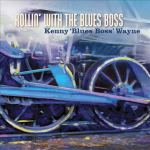
It’s almost impossible to make the blues sound fresh after a century. Kenny “Blues Boss” Wayne rocks those same old one-four-five, AABA verses with no real change in lyrical content, and as he’s savvy enough to note in his own PR, he’s not the least bit reluctant to carry the flag: “They say what I’m doin’ has been done before / That’s my reason to do it even more,” he claims on “Keep On Rockin.’”
His vocals are merely competent, although they do showcase his goodtime ethos, like Cee-Lo Green with an extremely blunted range.
The fact that piano, not guitar is his main instrument helps set Kenny apart, even if his stride-meets-boogie style is also nothing you haven’t heard. And while he works the soul-blues angle like the vet he is (he began his stage career backing Jimmy Reed), Wayne comes off pretty pedestrian next to surviving greats like Bobby Rush or Bobby Womack. (He’s comfortable sneaking around on a Saturday night in the lines of “Leavin’ in the Morning,” then sticking around for his Sunday morning comeuppance on “Baby, It Ain’t You,” but that’s about the extent of his emotional range.)
No, if you buy an album or ticket from the Blues Boss, you do so for the groove—he’s refined it at this point to a straight four most of the time, but with heavy funk accents, from which he works those old-school piano riffs. And while crafting a new bottle for his old wine is one thing, his version of the modern R&B beat is actually not all that different from what passes for pop now; “I Can’t Believe It” could almost make it over the Sonic Radio after school if it wasn’t about being robbed while waiting for a train.
The fact that he follows it with a straight boogie of indeterminate age (featuring Eric Bibb on guitar) proves he’s down home, but he’s still tantalizingly close to crossing over in a real way, given the way “Slow Down” adds so much soul to its Piedmont blues that it comes off as Southern Rock, or the way “Ogopogo Boogie”—the most authentic example of New Orleans piano here, complete with brass section—comes off so light and airy it seems like a hit remix of itself.
He may not be lyrically deep or vocally powerful enough to stun the blues world, but as an ambassador for soul-blues on the pop charts? Those shortcomings wouldn’t matter at all.




